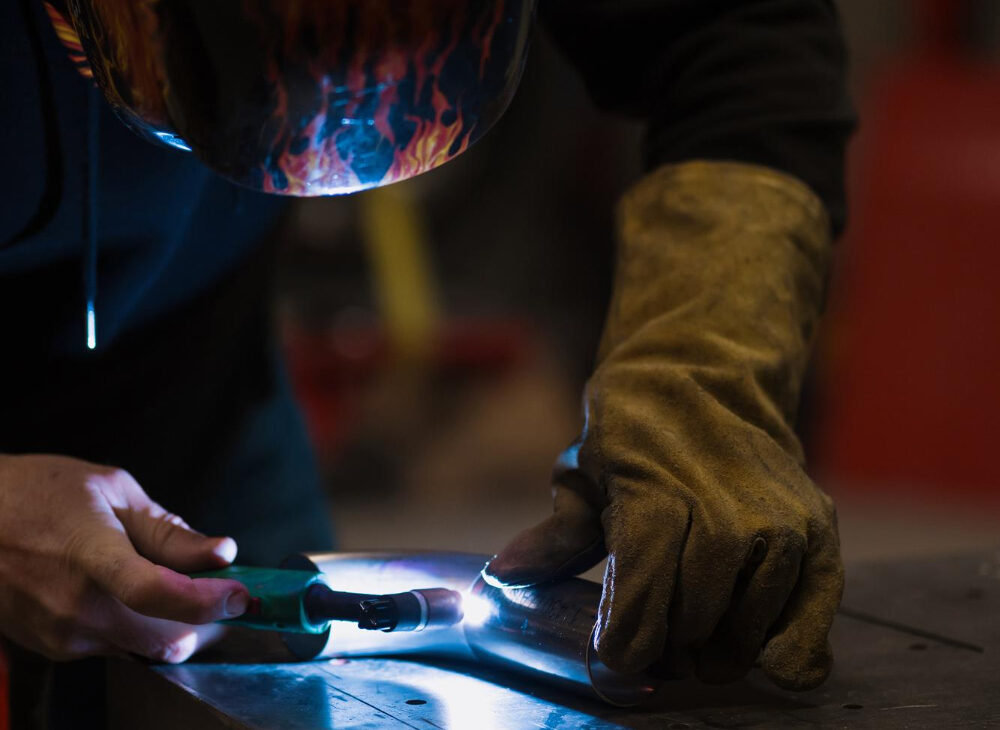Aluminum is widely used in construction, transportation, and fabrication because of its strength-to-weight ratio, corrosion resistance, and clean appearance. However, welding aluminum is notoriously tricky, especially compared to steel. Understanding the common problems that arise in aluminum welding—and knowing how to prevent them—can make the difference between a strong, clean weld and a failed joint. At Pegasus Mobile Welding, we specialize in Aluminum Welding and handle every job with precision and care.
Why Aluminum Welding Is More Complex Than Steel
Welding aluminum involves unique challenges due to the metal’s properties. It conducts heat much faster than steel, which can make heat control difficult. It also forms an oxide layer that melts at a much higher temperature than the base metal underneath. If the oxide is not removed properly, the weld will be weak or inconsistent. In addition, aluminum doesn’t change color when it’s heated—so there’s no visual cue to indicate when it’s ready to weld. These characteristics make aluminum far less forgiving, especially in outdoor or mobile environments.
Porosity: The Silent Killer in Aluminum Welds
One of the most common defects in aluminum welds is porosity—tiny bubbles that form inside the weld due to trapped gases. This happens when the base material is contaminated with moisture, oil, or dirt. Porosity can severely weaken the weld, leading to cracks or premature failure. The best way to prevent porosity is by thorough cleaning. Use a stainless steel brush reserved only for aluminum, followed by a solvent like acetone. Shielding gas purity is also critical; 100% argon is typically used for TIG and MIG aluminum welding to minimize gas contamination.
Preventing Cracks and Incomplete Fusion
Another common issue in aluminum welding is cracking, particularly hot cracking. This usually happens during the cooling phase when the metal contracts. It’s most likely to occur if the wrong filler metal is used or if the joint design is poor. To avoid this, select filler rods or wire that match the alloy type and application. Inadequate heat input can also cause incomplete fusion—where the weld doesn’t fully bond to the base metal. This issue can be resolved by proper heat control, slowing down travel speed, and using the right technique, especially in Aluminum TIG Welding.
Contamination: A Major Cause of Weld Failure
Aluminum is very reactive, especially at high temperatures. Any contamination—grease, oil, dirt, paint, or even air—can cause weld failures. One of the first steps in preparing aluminum for welding is cleaning. But it’s not just a quick wipe down. The oxide layer must be scrubbed away mechanically, and all grease must be dissolved chemically. Contamination can come from tools too, so always use clean, aluminum-only brushes and grinders. Our mobile welders carry specialized prep tools for each job site to ensure contamination is minimized.
MIG vs TIG for Aluminum Welding
When deciding between MIG and TIG welding for aluminum, the application often determines the method. TIG welding offers more precision and is better suited for thin materials or when appearance matters. MIG welding, on the other hand, is faster and better for thicker materials or long seams. At Pegasus Mobile Welding, we provide both options on-site, using high-end portable welding equipment. Whether you’re repairing a broken part, reinforcing a frame, or fabricating something new, we choose the method that ensures the best result for your specific project.
The Benefits of Working with Mobile Aluminum Welding Experts
Aluminum welding is not DIY-friendly. It requires not just the right machines, but also deep knowledge of metal behavior, filler compatibility, joint design, and environmental conditions. With mobile welding, you also need to handle variable wind, temperature, and power sources. That’s why hiring a certified mobile welder near me makes sense. At Pegasus Mobile Welding, we bring all the expertise and equipment directly to your site. Whether it’s a structural component or a small repair, our mobile aluminum welders deliver clean, durable, and code-compliant results—every time.
Real-World Applications Where Precision Matters
We’ve seen the consequences of poor aluminum welds: trailer cracks, broken automotive parts, and leaking tanks. In industries like transportation, construction, and food service, failure is not an option. For example, aluminum truck beds and trailer frames require strong welds that hold up under vibration and load. The same applies to food-grade aluminum used in commercial kitchens. In each case, clean welds are not just cosmetic—they’re functional. That’s why clients trust our mobile team for fast and reliable service.
Conclusion: Trust the Aluminum Welding Experts
Whether you’re dealing with cracked cast aluminum, building a new structure, or upgrading equipment, aluminum welding requires skill and experience. From preventing porosity and contamination to choosing between TIG and MIG, every step matters. At Pegasus Mobile Welding, we’ve built our reputation by delivering flawless aluminum welds in the field. Contact us today and discover why we’re the go-to team for professional aluminum welding and TIG aluminum repair.


